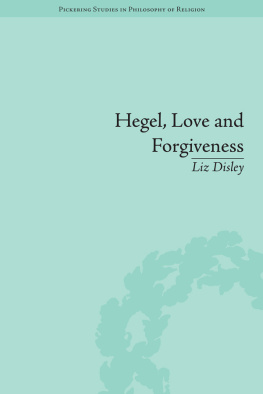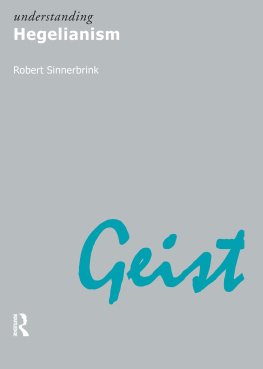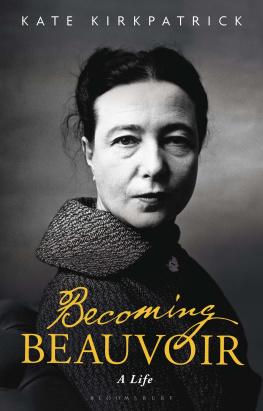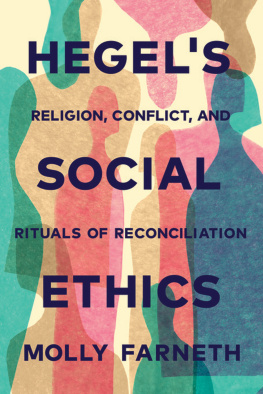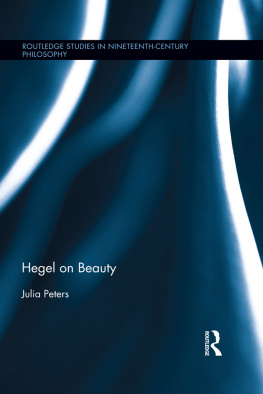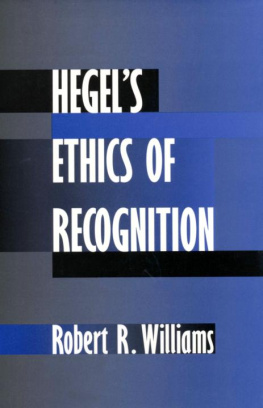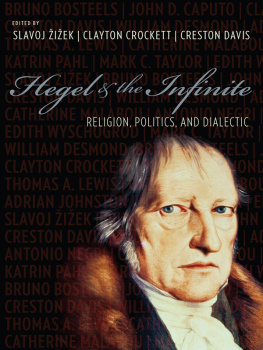HEGEL, LOVE AND FORGIVENESS:
POSITIVE RECOGNITION IN GERMAN
IDEALISM
PICKERING STUDIES IN PHILOSOPHY OF RELIGION
Series Editor: Russell Re Manning
TITLES IN THIS SERIES
1 Ineffability and Religious Experience
Guy Bennett-Hunter
2 Natural Theology in the Scientific Revolution
Katherine Calloway
FORTHCOMING TITLES
Eighteenth-Century Dissent and Cambridge Platonism
Louise Hickman
Galileo and the Conflict between Religion and Science
Gregory W.Dawes
HEGEL, LOVE AND FORGIVENESS:
POSITIVE RECOGNITION IN GERMAN
IDEALISM
BY
Liz Disley

First published 2015 by Pickering & Chatto (Publishers) Limited
Published 2016 by Routledge
2 Park Square, Milton Park, Abingdon, Oxon OX14 4RN
711 Third Avenue, New York, NY 10017, USA
Routledge is an imprint of the Taylor & Francis Group, an informa business
Taylor & Francis 2015
Liz Disley 2015
To the best of the Publishers knowledge every effort has been made to contact relevant copyright holders and to clear any relevant copyright issues.
Any omissions that come to their attention will be remedied in future editions.
All rights reserved, including those of translation into foreign languages. No part of this book may be reprinted or reproduced or utilised in any form or by any electronic, mechanical, or other means, now known or hereafter invented, including photocopying and recording, or in any information storage or retrieval system, without permission in writing from the publishers.
Notice:
Product or corporate names may be trademarks or registered trademarks, and are used only for identification and explanation without intent to infringe.
BRITISH LIBRARY CATALOGUING IN PUBLICATION DATA
Disley, Liz, author.
Hegel, love and forgiveness: positive recognition in German idealism. (Pickering studies in philosophy of religion)
1. Hegel, Georg Wilhelm Friedrich, 17701831 2. Recognition (Philosophy)
3. Intersubjectivity Moral and ethical aspects. 4. Ethics, Modern 19th century.
I. Title II. Series
193-dc23
ISBN13: 978-1-84893-520-4 (hbk)
Typeset by Pickering & Chatto (Publishers) Limited
CONTENTS
This monograph is a substantially revised and expanded version of my PhD thesis, submitted to the University of Cambridge, awarded in 2009. I would particularly like to thank Douglas Hedley, who supervised the writing of this, for his enormously valuable guidance at all stages of the process. I would also like to thank the examiners, George Pattison and Russell Re Manning, for their extremely useful reports on the original thesis.
Part of the revisions and transformation of this work from thesis to monograph took place whilst I was employed as Project Manager and Research Assistant on the Impact of Idealism International network, funded by the Leverhulme and Newton trusts. I, and this work in general, benefitted greatly from observing and participating in scholarly exchange about the legacy and contemporary relevance of German Idealism. This work crosses boundaries between philosophy, particularly philosophical anthropology, and theology, and this interdisciplinarity has been greatly enhanced by my participation in the network. I am therefore grateful to all of the participants, and particularly the Principal Investigator, Nicholas Boyle, for their support at all stages.
During this period, I held a Fellow-Commonership at Magdalene College, Cambridge, which also, through the Leslie Wilson studentship, funded the PhD research that formed the original basis for this monograph. I am immensely grateful for the financial support, and for the membership of this scholarly community.
I would also like to thank the University of St Andrews, where I am an Honorary Fellow in the Departments of Philosophy. My research in general has benefitted greatly from seminars, reading groups and the intellectual community in general.
I am also grateful to three anonymous reviewers for their extremely helpful comments at the review stage, and Sophie Rudland at Pickering & Chatto for her valuable practical assistance.
Without my husband Andrew, no part of the writing of this work, as thesis or as monograph, would have been possible. He has supported, encouraged and assisted in more ways than can be counted. It is to him that this work is dedicated.
Liz Disley
St Andrews, September 2014
EN | G. W. F. Hegel, Enzyklopedie der philosophischen Wissenschaften, ed. F. Nicolin and O. Poggeler (Hamburg: F. Meiner, 1959) |
FL | G. W. F Hegel, Fragment on Love, Early Theological Writings, trans. T. M. Knox, with introduction and fragments trans. R. Koner (Chicago, IL: University of Chicago Press, 1948) |
GPR | G. W. F. Hegel, Grundlinien der Philosophie des Rechts, Werke in 20 Bnden, ed. E. Moldenhauer and K. M. Michel, 20 vols (Suhrkamp: Frankfurt am Main 196971), vol. 7 |
PhG | G. W. F. Hegel, Phenomenologie des Geistes, Werke in 20 Bnden, ed. E. Moldenhauer and K. M. Michel, 20 vols (Suhrkamp: Frankfurt am Main 196971), vol. 3 |
Werke | G. W. F. Hegel, Werke in 20 Bnden, ed. E. Moldenhauer and K. M. Michel, 20 vols (Suhrkamp: Frankfurt am Main 196971) |
I begin by outlining briefly the main thesis of the monograph: love and forgiveness are both examples of positive recognition that can serve as ethical norms of human interaction, grounded in a monistic ontological framework that succeeds in allowing for the intersubjectivity necessary to make an ethics of the social world meaningful. This argument is important for Hegel studies, the study of German Idealism more generally, in areas of ethics and politics concerned with recognition and the social world, in the emergent field of social ontology and in metaphilosophical/meta-ethical discussions about the relationship between metaphysics and ethics. It is also particularly relevant to the philosophy of religion, since both the concepts of love and of recognition have theological aspects particularly in the concept of metanoia which have not been taken into account in work on recognition thus far. An idealist monist ontology has itself important theological aspects. I discuss this in more detail in .
I follow this with a brief account of the existing two main approaches to the question of recognition and, more generally, the social self in Hegels work. I call these the deflationary and antiquarian approaches. With the use of prominent examples, I show how the first approach is deficient in that it does not account for any metaphysical, ontological or epistemological underpinning for concepts in practical philosophy, leading the ethical or political aspects of the analysis towards an unwarranted pragmatism. Moreover, it leads to a serious neglect of the theological aspect of Hegels social philosophy, which I outline very briefly here (the broken middle, metanoia and freedom). The antiquarian approach sees Hegels concept of recognition as so tightly bound up with his metaphysical system that it can have no application beyond that. I outline the kind of application to contemporary social and political philosophy that the concept of recognition, see in the context of Hegels social philosophy and German idealism in general, might be expected to have. I also briefly introduce the meaning of positive recognition.

